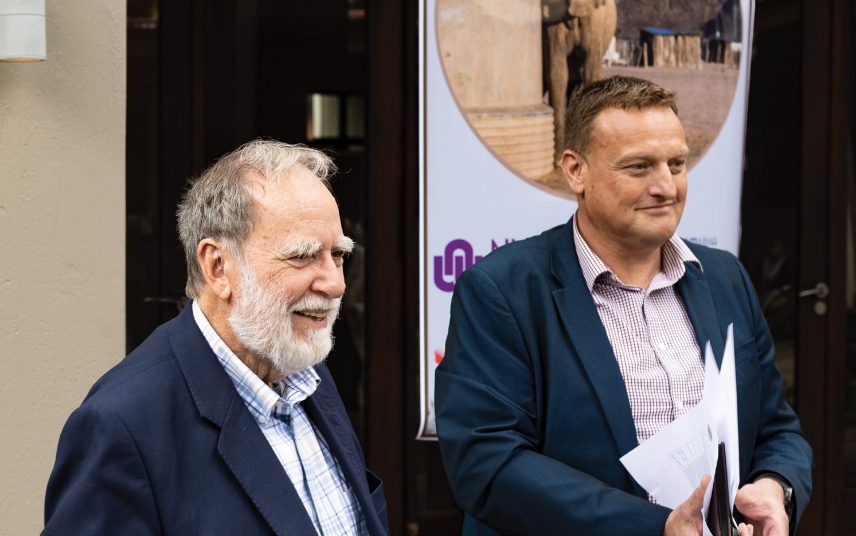Empowering Namibia’s conservation future

By linking research with policy initiatives, the fellowship aspires to create pathways for more and inclusive conservation strategies. Engaging with local communities and policymakers will ensure that conservation sound but also socially equitable.
“As a family, we have been deeply involved in nature conservation for many years. We believe that everything we do relies on being in touch with nature. We have a family creed that guides us: anyone who works with us, whether family or otherwise, commits to leaving the world a better place than we found it. To achieve this, we must build sustainable and prosperous societies while engaging with the land, its people and their customs. I believe this principle could serve as a powerful motto for any organisation.”
These were the words of Nicky Oppenheimer, speaking at the launch of the Oppenheimer Generations Research Fellowship in People and Wildlife in Namibia. The fellowship has been awarded to Dr Morgan Hauptfleisch, the director of research at the Namibia Nature Foundation and a renowned figure in the Namibian conservation landscape with a passion for growing young conservation scientists.
Dr Hauptfleisch has been at the forefront of innovative research and conservation strategies that not only protect wildlife but also address the complex interactions between humans and nature. “Morgan has a longstanding relationship with our family, dating back to his time working for us at a small conservancy in South Africa. We always recognised his potential, and I believe we were right,” according to Oppenheimer.
At the ceremony honouring his award, Dr Hauptfleisch remarked, “Throughout my journey, I’ve carved out a niche in Namibia’s conservation landscape, focusing on environmental assessment, human-wildlife conflict and wildlife movement ecology. My research has always been fuelled by passionate postgraduate students who support the science-conservation interface. I see myself as a bridge between science and conservation, appreciating both perspectives.”
Regarding the future of conservation in Namibia, Dr Hauptfleisch added, “Namibia is unique in its conservation approach because people live alongside wildlife. We have largely moved away from traditional ‘fortress conservation’. While we still have some areas that reflect this model, the trend is shifting towards coexistence, where benefits can flow to both wildlife and local communities.”
Dr Hauptfleisch noted that the fellowship is crucial for fostering collaboration among universities: “While I will continue my role at the Namibia University of Science and Technology, we want to widen our net and tap into the skills available at other Namibian universities. By collaborating, we can enhance indigenous knowledge management and leverage expertise from various institutions, including the University of Namibia and the International University of Management.”
One of the primary goals of the fellowship is to empower young Namibian scientists to address pressing questions about coexistence between people and wildlife. Through this programme, two Namibians will receive bursaries for PhD studies, while four others will be awarded bursaries for their master’s degrees. “All of them will receive support through this project. Additionally, we will continue to supervise existing students to ensure a robust academic framework,” added Dr Hauptfleisch.



One of the recipients completing her PhD studies is Monika Shikongo, who made history as Namibia’s first female park manager. Now serving as the transfrontier conservation areas and landscape management coordinator at the Ministry of Environment, Forestry and Tourism, Monica will use this bursary to explore the economic potential of the black rhino custodian programmes on freehold farmland in Namibia. She explains, “My first objective is to evaluate the cost-benefit analysis and return on investment of the black rhino custodian programme over its 30-year history on freehold farms. We want to understand what has happened throughout this period.” According to Dr Hauptfleisch, the fellowship also aims to identify various barriers that hinder effective conservation efforts, whether they be policy-related, economic or physical. Understanding these challenges is crucial for developing actionable strategies. “Once we’ve identified these barriers, we can begin to influence policy. By linking scientific research with policy initiatives, the fellowship aspires to create pathways for more effective and inclusive conservation strategies. Engaging with local communities and policymakers will ensure that conservation efforts are not only scientifically sound but also socially equitable,” he said.
Another exciting aspect of the fellowship is its emphasis on honouring the wealth of knowledge that communities possess. “We are thrilled about the concept of para-ecologists – individuals with indigenous knowledge who have been gathering data for years,” said Dr Hauptfleisch. “We believe these local experts can make a significant contribution to scientific research and publications.”
The fellowship is poised not only to enhance conservation efforts, but also to cultivate meaningful interactions between communities and wildlife. This prospect excites Dr Hauptfleisch: “I look forward to exploring how wildlife fits into the socio-economic fabric of rural land in Namibia and collaborating with our partners to tackle these critical issues.” Echoing this enthusiasm, Oppenheimer stated, “We are truly excited to embark on an initiative that we believe will make a real difference and foster growth and interaction between people and wildlife in Namibia.”
Kirsty Watermeyer






